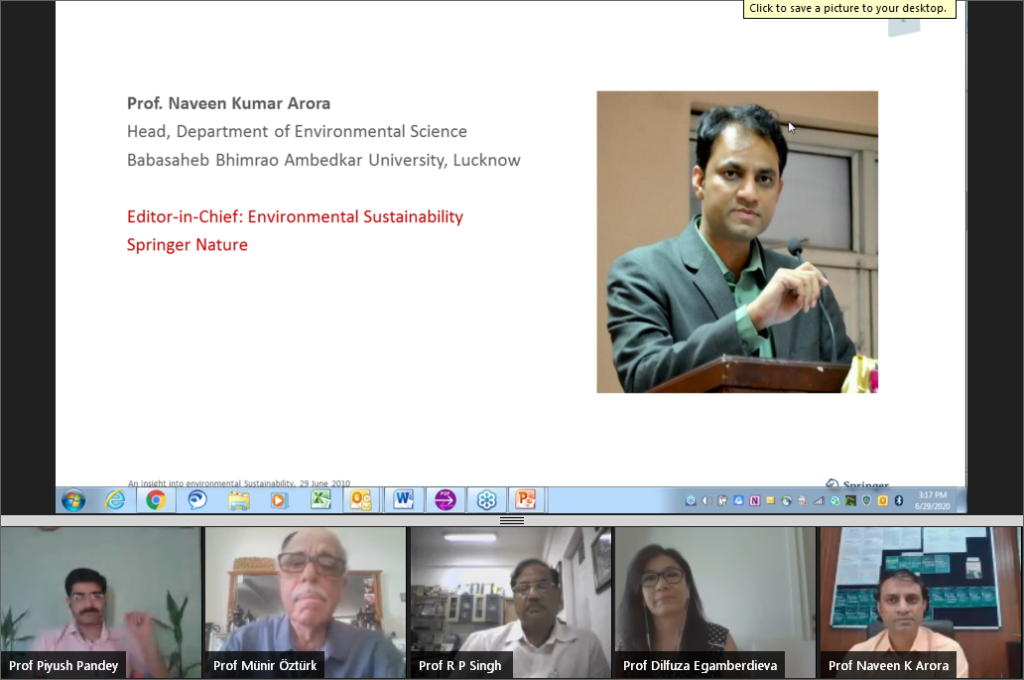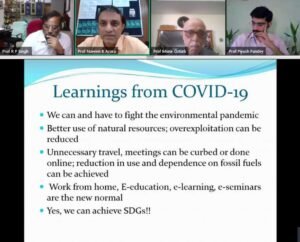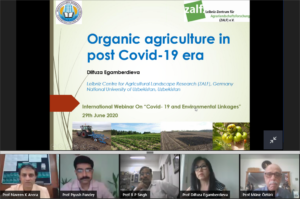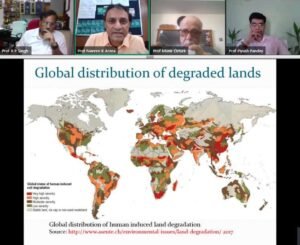
Report
Society for Environmental Sustainability organized an International Webinar on title “COVID- 19 and Environmental Linkages” in collaboration with Babasaheb Bhimrao Ambedkar University, Lucknow and Springer Nature on 29th June, 2020. Prof. Naveen Kr. Arora, General Secretary, SES was the Organizing Secretary and Convener of the Webinar.
There were 04 speakers from four different countries including Prof Dilantha Fernando, Canada, Prof Munir Öztürk, Turkey, Dr Dilfuza Egamberdieva, Uzbekistan/ Germany and Prof Piyush Pandey, India. The webinar was started by Dr. Mamta Kapila, Executive Editor, Medicine and Life Sciences Journal, Springer Nature. Dr. Mamta briefed about Springer Nature and talked about Environmental Sustainability and Sustainable Goals.

Prof. Naveen Kr. Arora introduced the theme of the Webinar. He told how the pandemic like COVID-19 has originated on the earth and how it’s spreading due to environmental issues created by humans. These types of pandemics have originated before and in future also, if we do not improve and protect our environment. Prof. Arora said that due to human-induced activities, the environment is being harmed more will come in future.Due to which such epidemics are increasing. There have been such epidemics in the last several years, of which this is the most dangerous.Environmental related activities like pollution, deforestation, greenhouse emissions, climate change, faulty agricultural work, livestock production, wildlife hunting and their meat consumption, such activities are increasing due to human population causing damage to the environment. If all these activities will not be stopped, then in future such pandemic could bring about even more deadly pathogens. He also informed about the brighter side of the pandemic. The learning from the pandemic, how environment can be improved and pollution brought down.
Welcome Address was given by Prof. Rana Pratap Singh, Dean Academics, BBA University and President, Society for Environmental Sustainability.He said wildlife is being affected by the cutting of forests, consumption of animal meat is increasing their hunting, in this way wildlife is ending and pollution is increasing. He talked about good and bad impacts both like water and air pollution improved during COVID- 19 and now we have see may kind of birds during lockdown. He also stressed upon translational research from lab to field and on sensitization of population.
Inaugural addressed was delivered by Prof. Sanjay Singh, Vice Chancellor, BBA University. He said about importance of green environment. He said many types of dangerous pathogens are coming up. We are using many chemicals in agriculture, due to which pollution is occurring and ecosystems are affected. He said farmers should use natural pesticides. He also emphasized upon the natural balance and reduction of overexploitation of resources.
First Invited talk was delivered by Prof. Dilantha Fernando, Dean, Department of Plant Sciences, University of Manitoba, Winnipeg, Canada. He explained the consequences of Corona virus. He said we have learnt lessons how to improve nature during lockdown. He said that the corona virus will be defeated by scientific innovation. He also gave a global scenario of COVID- 19 and how some countries are doing will in this pandemic.

Second Invited talk was delivered by Dr. Dilfuza Egamberdieva, Head of Research Joint Lab “Ecosystem and Biomes” National University of Uzbekistan. She explained about Organic agriculture and food security in post COVID- 19 era. She said about Importance of organic agriculture in countries most affected by climate change.The conclusion of her talk that COVID- 19 pandemic raises the alarm on the urgent need to transform the world’s food systems and agricultural production, which is impacted due to climate change and biodiversity loss, making them more inclusive, sustainable and resilient. It is important to invest in research, extension and education on alternative approaches of fertilization, considering in particular the eco-friendly farming systems under a wide range of soil, water and climate conditions.
The third speaker was Dr. Munir Oztruk, Founding Director- Centre for Environmental Studies, Ege University, Turkey. He said the best way to fight this pandemic is to share, cooperate and collaborate. He advised to use herbs in COVID- 19 treatment. More than 125 species of plants and their ingredients use in these treatment formulations.He told Ministry of AYUSH in India recommended to take Chyavanprash formula to improve immunity. He said we are faced with an unknown virus. This is an unprecedented global war in which mankind is facing the same enemy.

At the end of his talk he said let us be brave and positive, make up mind, take precautions but start our normal life. The fourth and last invited speaker was Prof. Piyush Pandey, Head, Department of Microbiology, Assam University, Assam. He discussed about the cross talk between Environment and Pandemic, with reference to COVID- 19. He said the current pandemic of COVID 19 is caused by SARS- CoV-2 which was firstly identified in December- 2019 in Wuhan city, China. He explained the comparative analysis of SARS CoV-2 genome sequences.
He was also discussed about significance of Environmental factors, the role of environmental factors to transmission of COVID – 19. He talked about the effect of COVID- 19 pandemic on the environment. COVID- 19 pandemic has reduced utilization of fossil fuels worldwide which could be reducing carbon emissions. Pandemic imposed lockdowns have paralyzed both air and ground travel consequently the demand for fuel has come down improving air quality and water bodies. He said that like river Ganga has to come pollution free at several places during lockdown.
At the end of webinar Prof. Naveen Kr. Arora, Convener of the webinar delivered the vote of thanks to the Speakers and the team of Springer for their collaboration. He said that the webinar was a great success as 738 participants from several countries around the globe attended the webinar and learnt about COVID- 19 and environment. 81% participants were satisfied from this webinar and suggest organizing such webinar in future.
